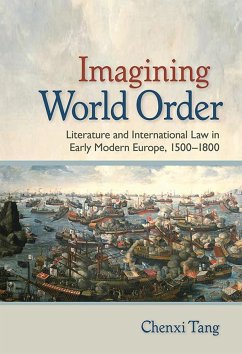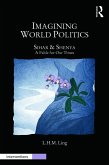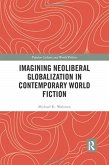- Gebundenes Buch
- Merkliste
- Auf die Merkliste
- Bewerten Bewerten
- Teilen
- Produkt teilen
- Produkterinnerung
- Produkterinnerung
In early modern Europe, international law emerged as a means of governing relations between rapidly consolidating sovereign states, purporting to establish a normative order for the perilous international world. However, it was intrinsically fragile and uncertain, for sovereign states had no acknowledged common authority that would create...
Andere Kunden interessierten sich auch für
![Imagining World Politics Imagining World Politics]() L. H. M. LingImagining World Politics55,99 €
L. H. M. LingImagining World Politics55,99 €![Imagining Global Futures Imagining Global Futures]() Adom GetachewImagining Global Futures17,99 €
Adom GetachewImagining Global Futures17,99 €![Imagining the Byzantine Past Imagining the Byzantine Past]() Elena N. Boeck (Chicago DePaul University)Imagining the Byzantine Past63,99 €
Elena N. Boeck (Chicago DePaul University)Imagining the Byzantine Past63,99 €![Imagining the British Atlantic After the American Revolution Imagining the British Atlantic After the American Revolution]() Imagining the British Atlantic After the American Revolution89,99 €
Imagining the British Atlantic After the American Revolution89,99 €![Imagining the World from Behind the Iron Curtain Imagining the World from Behind the Iron Curtain]() Malgorzata Fidelis (Associate Profe Associate Professor of HistoryImagining the World from Behind the Iron Curtain79,99 €
Malgorzata Fidelis (Associate Profe Associate Professor of HistoryImagining the World from Behind the Iron Curtain79,99 €![Imagining Neoliberal Globalization in Contemporary World Fiction Imagining Neoliberal Globalization in Contemporary World Fiction]() Michael WalonenImagining Neoliberal Globalization in Contemporary World Fiction31,99 €
Michael WalonenImagining Neoliberal Globalization in Contemporary World Fiction31,99 €![Imagining Arcadia in Renaissance Romance Imagining Arcadia in Renaissance Romance]() Marsha S. CollinsImagining Arcadia in Renaissance Romance47,99 €
Marsha S. CollinsImagining Arcadia in Renaissance Romance47,99 €-
-
-
In early modern Europe, international law emerged as a means of governing relations between rapidly consolidating sovereign states, purporting to establish a normative order for the perilous international world. However, it was intrinsically fragile and uncertain, for sovereign states had no acknowledged common authority that would create...
Hinweis: Dieser Artikel kann nur an eine deutsche Lieferadresse ausgeliefert werden.
Hinweis: Dieser Artikel kann nur an eine deutsche Lieferadresse ausgeliefert werden.
Produktdetails
- Produktdetails
- Verlag: Cornell University Press
- Seitenzahl: 360
- Erscheinungstermin: 15. Dezember 2018
- Englisch
- Abmessung: 162mm x 237mm x 24mm
- Gewicht: 690g
- ISBN-13: 9781501716911
- ISBN-10: 1501716913
- Artikelnr.: 51989270
- Herstellerkennzeichnung
- Libri GmbH
- Europaallee 1
- 36244 Bad Hersfeld
- gpsr@libri.de
- Verlag: Cornell University Press
- Seitenzahl: 360
- Erscheinungstermin: 15. Dezember 2018
- Englisch
- Abmessung: 162mm x 237mm x 24mm
- Gewicht: 690g
- ISBN-13: 9781501716911
- ISBN-10: 1501716913
- Artikelnr.: 51989270
- Herstellerkennzeichnung
- Libri GmbH
- Europaallee 1
- 36244 Bad Hersfeld
- gpsr@libri.de
Chenxi Tang is Professor of German, University of California at Berkeley. He is the author of The Geographic Imagination of Modernity.
Acknowledgments
Introduction
International Law
Literary Approaches to International World Order
A Dual History of International Law and European Literature
1. The Old World Order Dissolving
Universal Laws in Flux: (Neoscholastic Jurisprudence)
Cosmic Order Disturbed: (Camões's Os Lusíadas, Reason of State)
The Beginnings of Public International Law: (Gentili, Suárez, Grotius)
2. The Poetics of International Legal Order
Treaty and Allegory in the Renaissance
The Founding Narratives of International Legal Personality: (Grotius,
Hobbes, Leibniz)
The Founding Narratives of International Society: (Grotius, Leibniz)
Spectacles of International Order
The Drama of International Society
3. International Order as Tragedy
The Renaissance of Tragedy and the Problem of International Order
The Sovereign Will and the Tragic Form: (Marlowe's Tamburlaine,
Shakespeare's King John)
A Tragicomic Intermezzo: The Shapes of World Order in Shakespeare's
Romances
The Tragedy of Reason of State: (Lohenstein)
The Tragedy of Marriage Alliance: (Corneille)
International Order Through Tragic Experience
4. International Order as Romance
The Romance Form and World Order: (The Greek Romance, Barclay's Argenis)
The Crisis of Political Romance in the Mid-Seventeenth Century: (Herbert)
The Apotheosis and Extinction of Political Romance: (Anton Ulrich, Leibniz)
5. The Divergence Between International Law and Literature around 1700
The Depersonalization of the State: (Gryphius, Milton)
The Birth of the Private Individual: (Milton, Racine)
International Law as a Field of Expert Knowledge
Literature and the Private Individual
6. The Novel and International Order in the Eighteenth Century
The Fictional Construction of Society: Ius Naturae et Gentium
The Fictional Construction of Society: Poetics of the Novel
Transnational Commercial World Order: (Defoe)
Sentimental World Order: (Gellert, Sterne)
Cosmopolitan World Order: (Wieland, Goethe, Kant)
Epilogue
Notes
References
Index
Introduction
International Law
Literary Approaches to International World Order
A Dual History of International Law and European Literature
1. The Old World Order Dissolving
Universal Laws in Flux: (Neoscholastic Jurisprudence)
Cosmic Order Disturbed: (Camões's Os Lusíadas, Reason of State)
The Beginnings of Public International Law: (Gentili, Suárez, Grotius)
2. The Poetics of International Legal Order
Treaty and Allegory in the Renaissance
The Founding Narratives of International Legal Personality: (Grotius,
Hobbes, Leibniz)
The Founding Narratives of International Society: (Grotius, Leibniz)
Spectacles of International Order
The Drama of International Society
3. International Order as Tragedy
The Renaissance of Tragedy and the Problem of International Order
The Sovereign Will and the Tragic Form: (Marlowe's Tamburlaine,
Shakespeare's King John)
A Tragicomic Intermezzo: The Shapes of World Order in Shakespeare's
Romances
The Tragedy of Reason of State: (Lohenstein)
The Tragedy of Marriage Alliance: (Corneille)
International Order Through Tragic Experience
4. International Order as Romance
The Romance Form and World Order: (The Greek Romance, Barclay's Argenis)
The Crisis of Political Romance in the Mid-Seventeenth Century: (Herbert)
The Apotheosis and Extinction of Political Romance: (Anton Ulrich, Leibniz)
5. The Divergence Between International Law and Literature around 1700
The Depersonalization of the State: (Gryphius, Milton)
The Birth of the Private Individual: (Milton, Racine)
International Law as a Field of Expert Knowledge
Literature and the Private Individual
6. The Novel and International Order in the Eighteenth Century
The Fictional Construction of Society: Ius Naturae et Gentium
The Fictional Construction of Society: Poetics of the Novel
Transnational Commercial World Order: (Defoe)
Sentimental World Order: (Gellert, Sterne)
Cosmopolitan World Order: (Wieland, Goethe, Kant)
Epilogue
Notes
References
Index
Acknowledgments
Introduction
International Law
Literary Approaches to International World Order
A Dual History of International Law and European Literature
1. The Old World Order Dissolving
Universal Laws in Flux: (Neoscholastic Jurisprudence)
Cosmic Order Disturbed: (Camões's Os Lusíadas, Reason of State)
The Beginnings of Public International Law: (Gentili, Suárez, Grotius)
2. The Poetics of International Legal Order
Treaty and Allegory in the Renaissance
The Founding Narratives of International Legal Personality: (Grotius,
Hobbes, Leibniz)
The Founding Narratives of International Society: (Grotius, Leibniz)
Spectacles of International Order
The Drama of International Society
3. International Order as Tragedy
The Renaissance of Tragedy and the Problem of International Order
The Sovereign Will and the Tragic Form: (Marlowe's Tamburlaine,
Shakespeare's King John)
A Tragicomic Intermezzo: The Shapes of World Order in Shakespeare's
Romances
The Tragedy of Reason of State: (Lohenstein)
The Tragedy of Marriage Alliance: (Corneille)
International Order Through Tragic Experience
4. International Order as Romance
The Romance Form and World Order: (The Greek Romance, Barclay's Argenis)
The Crisis of Political Romance in the Mid-Seventeenth Century: (Herbert)
The Apotheosis and Extinction of Political Romance: (Anton Ulrich, Leibniz)
5. The Divergence Between International Law and Literature around 1700
The Depersonalization of the State: (Gryphius, Milton)
The Birth of the Private Individual: (Milton, Racine)
International Law as a Field of Expert Knowledge
Literature and the Private Individual
6. The Novel and International Order in the Eighteenth Century
The Fictional Construction of Society: Ius Naturae et Gentium
The Fictional Construction of Society: Poetics of the Novel
Transnational Commercial World Order: (Defoe)
Sentimental World Order: (Gellert, Sterne)
Cosmopolitan World Order: (Wieland, Goethe, Kant)
Epilogue
Notes
References
Index
Introduction
International Law
Literary Approaches to International World Order
A Dual History of International Law and European Literature
1. The Old World Order Dissolving
Universal Laws in Flux: (Neoscholastic Jurisprudence)
Cosmic Order Disturbed: (Camões's Os Lusíadas, Reason of State)
The Beginnings of Public International Law: (Gentili, Suárez, Grotius)
2. The Poetics of International Legal Order
Treaty and Allegory in the Renaissance
The Founding Narratives of International Legal Personality: (Grotius,
Hobbes, Leibniz)
The Founding Narratives of International Society: (Grotius, Leibniz)
Spectacles of International Order
The Drama of International Society
3. International Order as Tragedy
The Renaissance of Tragedy and the Problem of International Order
The Sovereign Will and the Tragic Form: (Marlowe's Tamburlaine,
Shakespeare's King John)
A Tragicomic Intermezzo: The Shapes of World Order in Shakespeare's
Romances
The Tragedy of Reason of State: (Lohenstein)
The Tragedy of Marriage Alliance: (Corneille)
International Order Through Tragic Experience
4. International Order as Romance
The Romance Form and World Order: (The Greek Romance, Barclay's Argenis)
The Crisis of Political Romance in the Mid-Seventeenth Century: (Herbert)
The Apotheosis and Extinction of Political Romance: (Anton Ulrich, Leibniz)
5. The Divergence Between International Law and Literature around 1700
The Depersonalization of the State: (Gryphius, Milton)
The Birth of the Private Individual: (Milton, Racine)
International Law as a Field of Expert Knowledge
Literature and the Private Individual
6. The Novel and International Order in the Eighteenth Century
The Fictional Construction of Society: Ius Naturae et Gentium
The Fictional Construction of Society: Poetics of the Novel
Transnational Commercial World Order: (Defoe)
Sentimental World Order: (Gellert, Sterne)
Cosmopolitan World Order: (Wieland, Goethe, Kant)
Epilogue
Notes
References
Index








